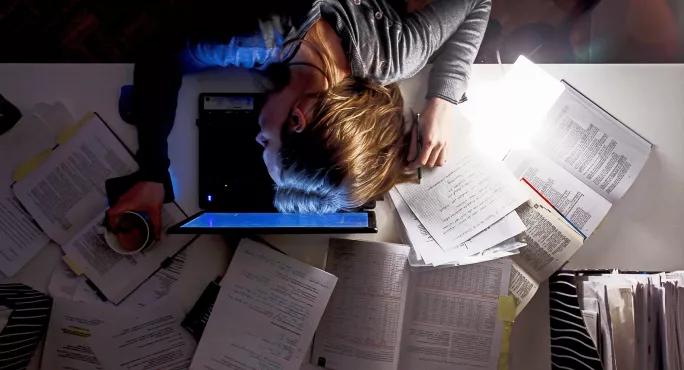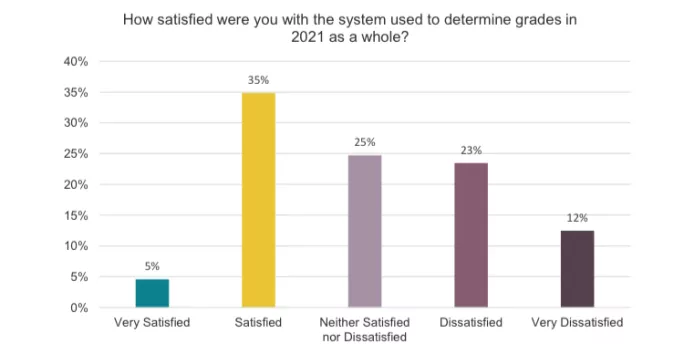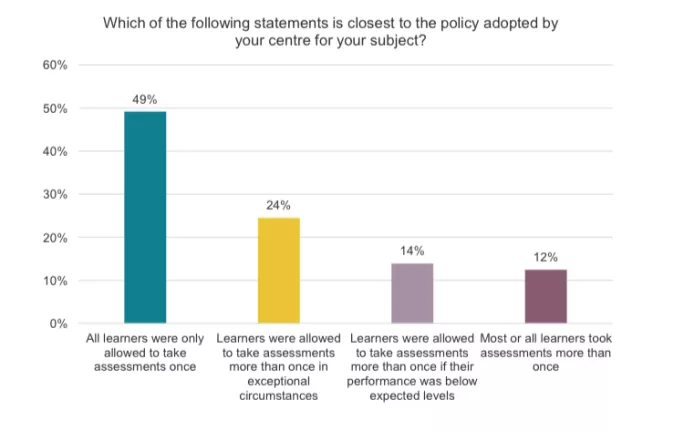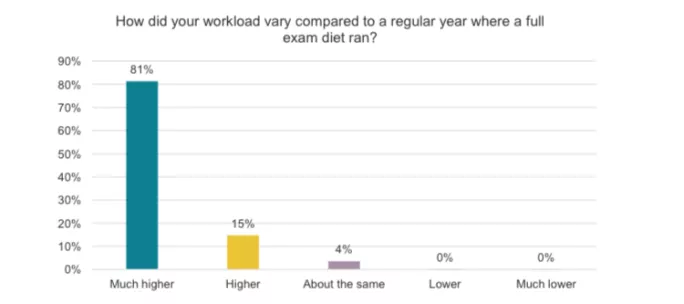SQA: 2021 exam replacement made teachers consider quitting

The changes to assessment put in place in 2021, when the exams in Scotland were cancelled because of the coronavirus pandemic, significantly increased teacher workload and were “almost unmanageable” for staff, new research shows.
Findings published today by the Scottish Qualifications Authority (SQA) underlines that the experience of assessing students in 2021 placed a tremendous burden on teachers - with the vast majority saying their workload was higher than in a normal year - and some even admitting that the experience of assessing students in 2021 had made them consider leaving the profession.
A research paper, which the SQA says it carried out to better understand the real impact of the “alternative certification model” (ACM) on students and teachers, states: “A good number of respondents argued that the significantly increased workload in 2021 was difficult and stressful (‘almost unmanageable’, ‘virtually unworkable’) and expressed the hope that the system would not be used again. Indeed, more than one stated that the experience had made them question their continued involvement in the teaching profession.”
Only 40 per cent of teachers were satisfied with the system used to determine grades in 2021.

The findings are significant given the ongoing independent review of assessment and qualifications led by Professor Louise Hayward and recent calls for there to be less of a focus on end-of-year exams in the future, as well as more focus on teacher judgement.
However, the research also finds that most teachers believed the grades their learners received were fair (77 per cent thought the grades were fair; 13 per cent thought they were unfair), and over 90 per cent felt confident or very confident making marking judgements (92 per cent).
Learners were less likely to agree the results they received in 2021 were fair: 69 per cent agreed or strongly agreed their results were fair, and 34 per cent said they were satisfied with the overall design of the assessment process in 2021.
Reasons for feelings of unfairness included lack of teaching time because of Covid, the volume of assessment that took place over a short space of time after the lockdown in early 2021, and the fact that exam papers were leaked online, giving some students an unfair advantage.
Students also took issue with the differing approaches taken to resitting assessments depending on the school.
One said: “‘The grading was not consistent as pupils in other areas had an unfair advantage because they were allowed to have more than one go at each type of paper and to submit the best results.”
The research finds that resitting assessments to gain a higher grade was “used across multiple centres and local authorities”, but not across all schools and councils.
It says some schools and councils banned resits but in others “learners were granted multiple attempts at assessments via resits”.
It also finds that some schools allowed resits when they came under pressure from parents.
The SQA practitioner survey - which involved over 450 teachers and lecturers - found 49 per cent of respondents saying that, in their school or college for their subject, students were only allowed to take assessments once.
On the other hand, 24 per cent of respondents said that students could take assessments more than once in exceptional circumstances; 14 per cent said that learners were allowed to take assessments more than once if their performance was below expected levels; and 12 per cent said that most or all students took assessments more than once.

The research says: “Whether learners were allowed to re-take assessments varied a lot, depending on the centre. Several allowed no resits or resits only in exceptional circumstances, for example, a learner not being able to attend an assessment. One participant said, ‘The [local authority] told us we weren’t allowed resits’, whereas others seemed to try and provide as many opportunities for learners to demonstrate their true potential as possible.
“Several practitioners said resits were not possible due to time and resource limitations. As with the learners, most practitioners did not consider having more than one piece of assessment evidence to choose from a form of resit. Some allowed resits if the final exam result was anomalous with other evidence or replaced it with other evidence. Some allowed it after petition by parents or carers.”
However, in May 2021 Tes Scotland asked the SQA what its position on resits was; at that time, it did not rule out the practice.
It said: “Our guidance is that a range of evidence should be used when reaching provisional results. If a school or college needs to undertake any form of re-assessment, they should use different material or methods.”
In the new research, teachers suggest a number of things that would have improved the 2021 alternative certification model, including “better communication from SQA, more rigorous quality assurance and a more uniform approach to marking across schools and local authorities”.
The SQA research was based on surveys carried out by the SQA in November 2021.
In total, survey responses were received from 1,210 learners and 482 practitioners from schools and colleges across Scotland; 83 per cent were from state schools.
In-depth interviews were also carried out with learners, practitioners, and principal assessors from December 2021 to February 2022.
The vast majority of teachers and lecturers said their workload in 2021 was much higher than in a normal year; 81 per cent said their workload was “much higher” than usual; 15 per cent said it was “higher”; and 4 per cent said it was “about the same”.
When it came to whether workload was lower in 2021, only one respondent said it was “lower”, and just one respondent said it was “much lower”.

Students also felt their workload was higher: 47 per cent said their workload was either much higher or higher than a regular year, 36 per cent felt it was about the same, and 16 per cent said it was lower or much lower. However, many students expressing views on how their assessment process compared to a more typical exam diet may not actually have experienced one.
The most common reason for workload increasing, according to teachers and lecturers, was “the increased marking burden”. But teachers also talked about the time taken up by quality assurance procedures like cross-marking and verification, as well as the time involved in developing assessments, scheduling them, and running them all at the same time as grappling with staffing issues caused by absence.
The research says: “Several respondents suggested that the £400 compensation that they had received was derisory and would amount to substantially less than minimum wage when compared to the extra work the ACM had incurred for practitioners.”
The SQA said it carried out the research “to better understand the real impact of the ACM on the learners and practitioners directly affected by it in 2021”, but that it had “made a conscious choice not to attempt to interpret the views expressed by participants and not to develop recommendations from them”.
The report - entitled Experiences of the 2021 Alternative Certification Model (ACM) - is one of a number of pieces of research published by the SQA today.
Martyn Ware, head of policy, research and standards at the SQA, said: “The Covid pandemic brought unprecedented challenges for learners, teachers, lecturers and the wider education community here in Scotland, in the rest of the UK and internationally. As Scotland’s national awarding body, it was essential for us to evaluate the alternative certification model that was put in place in 2021, and to hear the lived experience of those who used it.
“The reports have helped to build a picture of the experiences of learners, teachers and lecturers from across Scotland in 2021. They reflect the diverse and often differing experiences and views of our education community. For example, while some felt positively toward the ACM, others reported feeling more stress or having a higher workload than in a normal exam year.
“The findings reflect the importance of the ongoing national discussions around the future of qualifications and assessment in Scotland as we look to the future, as well as highlighting the potential challenges of reaching a consensus on what changes may be appropriate.”
Mr Ware added: “We are immensely grateful to the learners, teachers and lecturers who gave their time to share their experiences to help inform the content of the evaluation.”
The full research report can be accessed on the SQA website.
Register with Tes and you can read two free articles every month plus you'll have access to our range of award-winning newsletters.
topics in this article



